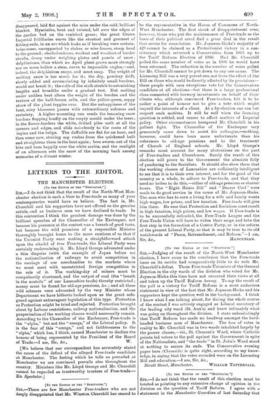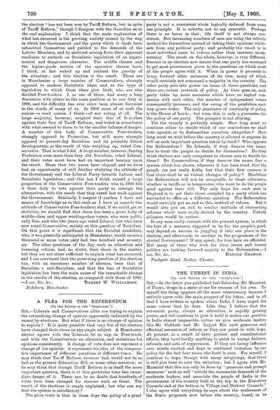THZ EDITOR or THE “SpecrAvor..1
do not think that the result of this election must be treated as pointing to any extensive change of opinion in the division on the question of Tariff Reform. I agree with a statement in the Manchester Guardian of last Saturday that
the election "has not been won by Tariff Reform, but in spite of Tariff .Reform;" though I disagree with the Guardian as to the real explanation. I think that the main explanation of what has occurred is the -growing anxiety caused by the way in which the Government and the party which it leads have
• eubtnitted themselves and yielded to the demands of the Labour Members, and by mistrust arising from their apparent readiness to embark on Socialistic legislation of an experi- mental and dangerous character. The middle classes and the higher-grade section of the operative classes have, .-think, at last waked up and realised the gravity of the situation ; and this election is the result. There are in Manchester a large number of Conservatives, strongly .opposed to modern Socialistic ideas and to the type of legislation to which those ideas give birth, who are also decided Free-traders. I, as one of these, had many a long discussion with others in the same position as to our duty in 1906, and the difficulty has ever since been almost 'foremost in the minds of many of us. In 1906 some of us took the course—a weak course, I think—of not voting at all. The large majority, however, weighed their fear of Sccildism against their fear of Tariff Reform, and voted in accordance with what seemed to them to be the smaller balanciof danger. A number of this body of Conservative Free-traders, strongly opposed to Protection, but still more strongly opposed to present-day Socialism and its probable future developments, as the result of this weighing up, voted Con- servative. That is what I did. A large number, however, fearing Protection even more than they did Socialism, voted Liberal, and their votes must have had an important bearing upon the result. Since then two years have elapsed, and we have had an opportunity of still further studying the attitude of the Government and the Liberal Party towards Labour and Socialistic legislation ; and this has, I think, caused a large proportion of the Conservative Free-traders who in 1906 felt it their duty to vote against their party to reweigh the alternatives, with the result that they voted last week against the Government. Similarly, I suspect (I confess I have not means of knowledge as to this such as I have as regards the attitude of Conservative Free-traders) that, if we could get at statistics, we should find that there has been a great body of middle-class and upper working-class voters, who were politi- cally free, and who two years ago voted Liberal, but who have now voted Conservative, mainly on this question of Socialism. On this point it is significant that the Socialist candidate, who, it was generally anticipated in Manchester, would secure a thousand or more votes, only had two hundred and seventy- six. The other questions_ of the day, such as education and licensing reform, had, no doubt, their share in the matter, but. they are not alone sufficient to explain what has occurred, and I am convinced that the governing question of the election has, _with an enormous number of electors, been that of Socialism v. anti-Socialism, and that the fear of Socialistic legislation has been the main cause of the remarkable change in the results of the election, as compared with those of 1906.









































 Previous page
Previous page